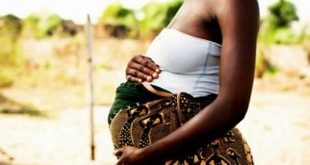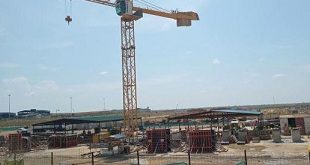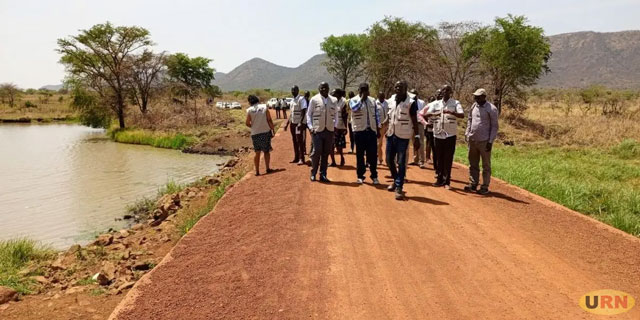
Rehabilitation of Community Road Excites Abim Residents
Abim, Uganda | THE INDEPENDENT & URN | Residents of Awach Sub County in Abim District are excited over the rehabilitation of Awach- Gangming community road.
Catholic Relief Services (CRS) has rehabilitated the Awach- Gangming community access road after 25 years since it was last graded by the district. On Tuesday, the road was commissioned after funding from the Catholic Relief Services (CRS) and USAID at a cost of sh268 million .
The 7.3km road which connects the three sub counties of Awach, Kiru and Orwamuge was last graded in 1998 yet it is a key road for the community. It is the nearest road to Orwamuge health center, Awach market and Awach primary school. It also links the sub county to other districts of Otuke, Amuria, Soroti, Lira, Pader and Agago in Acholi sub region.
Over the years, residents were unable to cross to the market, mothers were unable to take their sick children to hospital, and children were often unable to get to school because part of the road was prone to flooding after heavy rains.
It was also a big security threat in the sub county because cattle rustlers would take advantage of its impassable state to waylay locals and robbing them off their properties.
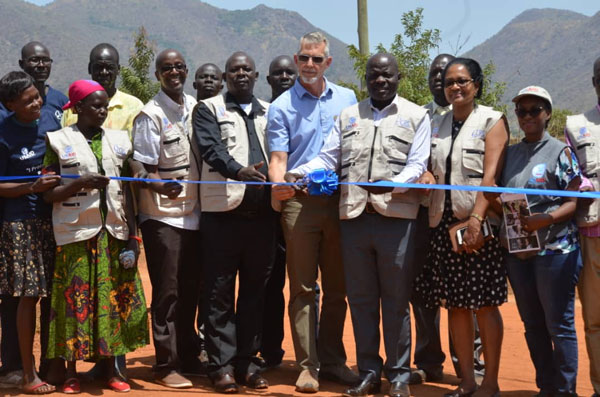
Awach sub-county residents say that following the rehabilitation of the road, they can now have access to basic services like markets, schools, and health facilities.
Charles Omugetum, the Acting Deputy Chief Administrative Officer Abim District who grew up in the area says that several people lost their lives in the hands of cattle rustlers who were using the road to carry out attacks.
Omugetum warned the residents against using ox- ploughs on the road while going to the garden.
“Some of these local are stubborn because as they are going to the garden they plough the road. You should plough the garden not the road so that it can stay for three, four, or five years because as a district we have very meager resources, the money that we were supposed to bring here should be taken somewhere else to work on other areas such that children and mothers in that area can access markets, schools and health facilities easily,” he said.
Charles Arube the District Engineer, said that the district will avail insufficient resources for routine maintenance of the road.
In the past five years, USAID and the Catholic Relief Services have spent over 590,000 USD to upgrade nine roads that cover more than 54 km of access roads in 36 villages in the Karamoja sub-region.
Awach Community identifies road
Under CRS’s Nuyok program members of the Awach community identified this access road as the most pressing issue they face. CRS agreed to the plan and with financial support from USAID, spearheaded the rehabilitation using a blend of labor based and mechanized grading and improvement of the cross and surface drainage conditions.
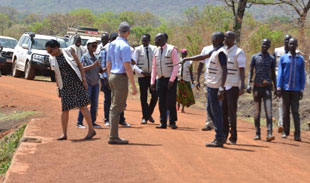
They providing fuel and lubricants for the road equipment given by the district while community members provided the required labour which was later paid for by CRS. The two-month rehabilitation project which cost 268 million shillings was commissioning on Tuesday.
Speaking during the commissioning ceremony, Olive D’Mello, the Acting Head of Programing at CRS noted that the communities in Karamoja face different shocks and stresses, including drought, flooding, water scarcity, conflicts with the associated insecurity. This she says “compounded by the impact of poor road infrastructure makes it difficult for the communities to access basic services like markets, schools, and health facilities.”
D’Mello said “Catholic Relief Services is proud to have been associated with this joint venture and are pleased that the local government has included this access road in their inventory of public works and is making the necessary budgetary provision to sustain its maintenance over time.”
He said all the road works that CRS has worked on in Karamoja are part of the greater achievements of the $43.6 million USAID funded Nuyok program.
On the other hand, Chip Bury, a Senior Humanitarian Assistance Officer at USAID who also witnessed the poor status of the road first hand says they invested in it to boost household incomes because “the USAID Nuyok project has worked on many issues in the region and it has addressed the nutrition needs of pregnant and lactating women and children under the age of two, boosting household incomes and mobilizing communities to advocate for improved governance on issues related to food and nutrition in the region.”
 The Independent Uganda: You get the Truth we Pay the Price
The Independent Uganda: You get the Truth we Pay the Price

